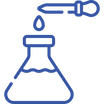Chemistry
“The country which is in advance of the rest of the world in chemistry will also be foremost in wealth and in general prosperity.” – William Ramsay (Nobel laureate in Chemistry, 1904)
Enquiry-based learning to stimulate students’ creativity
Using scenarios and designing experimental tasks that are closely related to life, we enable students to apply their knowledge of chemistry. Enquiry-based learning can develop students’ scientific inquiry skills, scientific logic, critical thinking skills and creativity and the ability to solve problems independently or together. For example, by studying the chemical composition of molecular cuisine, students can learn the application of condensation reactions in daily life.
Product-based Cross-curricular Course ‘Chocolate Factory’
With ‘Design Thinking’ as the paradigm, students have to consider how to improve chocolate formulas, such as to lower calories without losing sweetness or to increase antioxidant capacity to meet the needs of different consumers. They present their research results in groups with the speaking skills they have learned in English lessons.
Promote evidence-based teaching and learning with the Online Question Bank (OQB)
Assessment for learning: Based on the results of multiple assignments, teachers can use the system to systematically analyze student performance and understand the performance of the whole class or individual students on different topics and develop in-depth exercises to optimize teaching and enhance learning.
Assessment of learning: Students can analyze their relative performance in different areas of knowledge to find ways to improve. OQB can also record the questions that students have answered incorrectly so that they can easily generalize their mistakes and learn more effectively.
School-based teaching materials to deepen student thinking
- Introduce interdisciplinary language learning strategies to train students’ writing ability to describe experimental processes.
- Adopt the ‘dual-coding’ theory to promote the interconversion between text and graph in order to show students’ flow of idea construction, concept comparisons, and experimental procedures to promote students’ scientific thinking.
- Design exercises of different levels of difficulty to cater for the learning needs of students with different abilities.
- Provide a lot of extended reading and interesting links to Chemistry videos to cater for the development needs of gifted science students.
Application of electronic tools for distance teaching
In order to enhance teacher-student communication after class, the Chemistry Department uses the Zoom cloud video conference program to conduct distance teaching with students. Teachers can combine students’ briefings, files and archives to give students instant online commentary to help students construct knowledge. Students can also interact with teachers in real time to improve learning and teaching effectiveness.
Research-based training to nurture scientific research talents
School-based research hub with state-of-the-art facilities
Chemistry lectures
Visit to Chemistry Departments on university open days and STEM workshops
KTL STEM Hub
STEM Fun Day to promote science education
Learning without Boundaries: Global STEM Experience
Reading Scheme
Collaboration with the Hong Kong University of Science and Technology
To support the research work of the True Light Scientific Research Team
- In order to support the development of the KTL Scientific Research Team”, the school’s Chemistry Department and the Department of Chemistry of the Hong Kong University of Science and Technology provides valuable advice for our school-based research.
- Students have the opportunity to share their research work in Professor Lin Zhenyang’s laboratory. In the process, the professor teaches students how to optimize research. He also shares the pain and joy of conducting research.
Participation in the EDB's school-based support program
To develop an inquiry-based STEM interdisciplinary collaboration course
- We participate in the Education Bureau’s school-based support programme, and regularly communicate with the Education Bureau and fellow school co-workers to organize an inquiry-based “Chocolate Factory” course.
- The course can enhance students’ critical thinking through lesson plan discussions, class observations, assessments and the concerted efforts of all parties.
The Hong Kong Federation of Youth Groups
Training in experiment and report writing skills
- This programme provides advice for the KTL Scientific Research Team to participate in territory-wide competitions, enabling them to understand university-level experiments and develop report writing skills. Gifted science students can have a preview regarding their future study mode at university.
Collaborative project of the Chinese University of Hong Kong
Using online resources to promote problem-based learning
- Students are taught to use different online resources for data collection so that they can more effectively use the problem-based learning model for deep learning.
Promoting professional exchanges between teachers and building a culture of teaching and research
- Chemistry teachers hold professional development conferences on the annual theme. The discussion includes strategies to improve students’ common mistakes and analysis of assessment data to promote learning.
- In addition, each panel also conducts “mini-lesson studies”. Through the activities of problem identification, teaching plan design, open class and post-observation conferences, teachers actively communicate to continuously improve the effectiveness of learning and teaching





